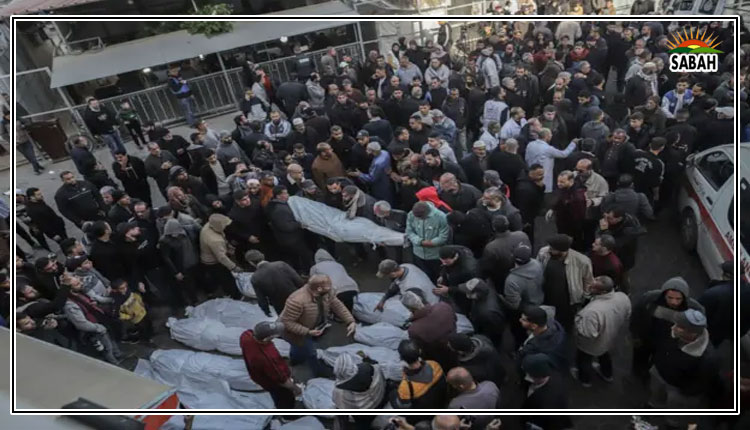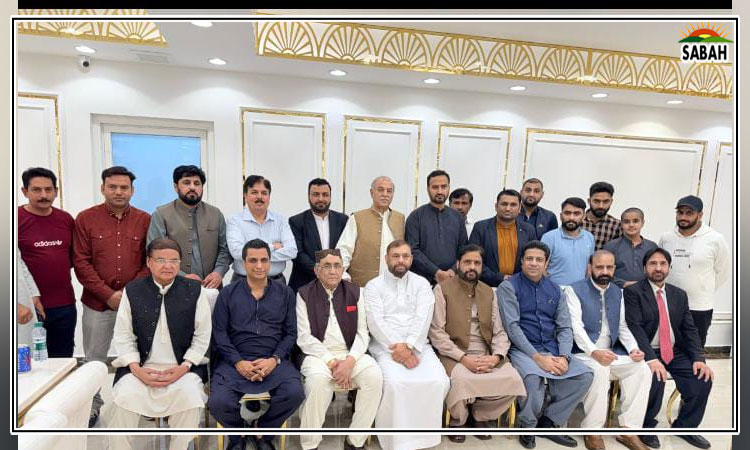A tale of contradictions …. Khuzair Raheem
In its 76-year-long history since its inception in 1947, Pakistan has often placed the blame for its shortcomings on external factors. This pattern of deflecting responsibility – instead of addressing our issues – is a journey marked by hypocrisy and moral contradictions. It is important to mention recent events to compare Pakistan’s reaction to two equally sensitive situations.
Since October 7, the Israeli defence forces have been carrying out a genocide against Palestinians. Astonishingly, as these events unfold, the world watches with a heavy heart, leaving the UN Security Council, human rights committees, and non-government organizations lost in contemplation.
Pakistan has been one of the few countries which have consistently questioned the legitimacy of Israel while unwaveringly extending support to the Palestinian cause. We have organized numerous nationwide rallies in support of Palestinians, tirelessly championed the call for a ceasefire, and flooded social media with posts exposing Israel’s role as the perpetrator and aggressor.
While these actions are equally commendable, a question still lingers: why do we as a nation only find our voice and unity when it aligns with our self-interest, revealing a sense of hypocrisy?
The Interior Ministry on October 3 announced that all migrants living without legal status in Pakistan had 28 days to leave voluntarily or face deportation, as part of the Illegal Foreigners Repatriation Plan (IFRP). The UN High Commissioner for Human Rights released a statement on October 27, stating: “We believe many of those facing deportation will be at grave risk of human rights violations if returned to Afghanistan, including arbitrary arrest and detention, torture, cruel and other inhuman treatment.
“Those at particular risk are civil society activists, journalists, human rights defenders, former government officials and security force members, and of course women and girls as a whole, who, as a result of the abhorrent policies currently in place in Afghanistan, are banned from secondary and tertiary education, working in many sectors and other aspects of daily and public life.”
The statement issued by the Pakistan Ministry of Foreign Affairs says: “The Illegal Foreigners Repatriation Plan (IFRP) applies to all illegal foreigners residing in Pakistan, irrespective of their nationality and country of origin. The decision is in exercise of Pakistan’s sovereign domestic laws, and compliant with applicable international norms and principles.”
Pakistan has welcomed nearly 3.8 million Afghan refugees who sought shelter in the country over the decades following the Soviet invasion in 1979. A notable surge, with an estimated 600,000 to 800,000 arrivals, has occurred since the Afghan Taliban’s resurgence to power in August 2021. According to the Pakistan government, there were about 4.0 million foreigners in the country before October 31, nearly 3.8 million of them Afghans. Of those, it says, only 2.2 million Afghans carry a government-approved document that makes them eligible to stay.
The interior minister gave the November 1 deadline to undocumented Afghan migrants to leave. Consequently, more than 200,000 Afghans have crossed into Afghanistan since October 31. A significant proportion of Afghan refugees currently living in Pakistan have dedicated a substantial part of their lives to establishing and maintaining sustainable businesses in Pakistan.
This has enabled them to provide their children with access to quality education and healthcare in contrast to the facilities available in the Taliban regime in Afghanistan. A huge percentage of Afghan refugees face an imminent risk of persecution and abuse if they are forcibly returned to Afghanistan.
Despite the already difficult circumstances, law-enforcement agencies continually subject documented Afghan residents in Pakistan to harassment and exploitation, extorting money from them in return for not causing further disturbances.
Following this crackdown, a substantial number of Pakistanis have fervently praised the efforts of the interim government. However, this stance raises concerns about our society’s double standards: are documented Afghanis, peacefully living in Pakistan, children of a lesser god?
A counter-argument presented in favour of the IFRP asserts that Afghan refugees have allegedly contributed to issues related to terrorism, weaponry, and drug trafficking within the region. However, it is crucial to avoid the broad generalization of an entire community based on the actions of a few individuals. This is particularly important when considering the efforts of those who are diligently working to secure a better future for their families.
Consider this scenario: a petition under Article 184(3) of the constitution was filed in the Supreme Court against the caretaker government’s decision for the refoulment of Afghan refugees and other undocumented migrants. The petition challenges the caretaker government’s decision as unconstitutional and illegal, arguing that many refugees have long-standing residency in Pakistan.
It contends that the policy adopted exceeds the mandate of the caretaker government, derived from Article 230 of the Elections Act, 2017. However, the registrar’s office returned the petition as being “not maintainable on account of not being a matter of human rights and constitutional importance”.
Amidst the outpouring of sympathy for Palestinians in the face of Israeli attacks, let us not forget to extend that same compassion to Afghans, who are now being forcibly repatriated to a perilous Afghanistan, where they confront the looming threat of persecution under the Taliban’s rule.
It is equally vital to recognize that as Pakistan confronts the challenges of terrorism and strives for stability, it maintains the right to enact thoughtful regulations to ensure a safe and well-defined process for the repatriation of Afghan refugees.
This framework should not be wielded as a tool to forcibly expel law-abiding documented Afghan residents from the country, but rather as a means to safeguard both their rights and the nation’s security. In the grand tapestry of history, a resounding lesson emerges: progressive societies find their foundation in the bedrock of tolerance, co-existence, and the common thread of empathy that binds us together, as human beings.
Senator Robert Kennedy’s speech, delivered shortly after the assassination of Martin Luther King stands as one of the most influential and compelling addresses ever delivered in the US.
It states: “When you teach a man to hate and fear his brother, when you teach that he is a lesser man because of his colour or his beliefs or the policies he pursues, when you teach that those who differ from you threaten your freedom or your job or your family, then you also learn to confront others not as fellow citizens but as enemies – to be met not with cooperation but with conquest, to be subjugated and mastered”.
The writer is a lawyer.
Courtesy The News












